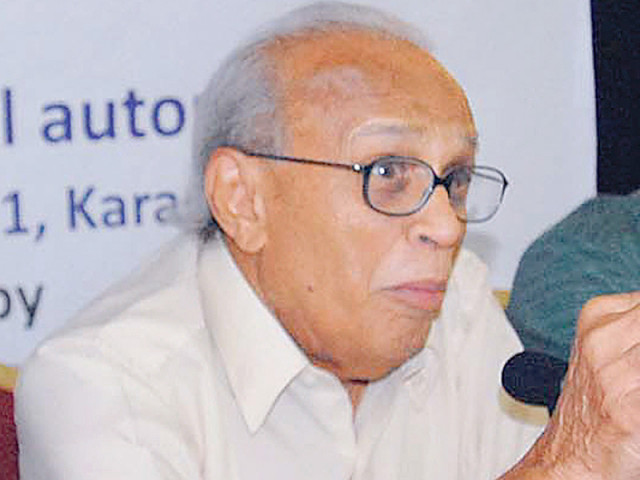Fakhruddin G Ebrahim: ‘An icon of democracy’
He never accepted anything against the spirit of law and the Constitution, says associate of Fakhruddin G Ebrahim.

Fakhruddin G Ebrahim: ‘An icon of democracy’
The character of an eminent jurist was potent enough to bring biter political rivals to a rare point of convergence. There is no one who will find fault with the new chief election commissioner, Justice (retd) Fakhruddin G Ebrahim.
“He is a man of extreme integrity and honour … you won’t find a single spot on his life,” said a leader from one of the main political parties to describe.
The pristine career of Ebrahim as a judge of the higher judiciary, a lawyer and statesman appeared to be enough for the Pakistan Peoples Party’s (PPP) decision to accept his nomination despite him being an opposition candidate.
The appointment, when made, will be unlike other appointments made by the government: not only is it being hailed across the entire political spectrum, but also by the legal fraternity and civil society.
Born on February 12, 1928, in the state of Gujarat, India, Ebrahim earned a name for himself when he refused to accept a Provisional Constitutional Order (PCO) issued by the then military dictator Gen. Ziaul Haq in early ‘80s and resigned as a judge.
However, it wouldn’t be the last time the jurist would resign in protest. In fact, it became somewhat of a hallmark for Ebrahim to leave distinguished posts as he refused to compromise on his principles, including the governorship of Sindh.
“This is what he is famous for … he never accepted anything against the spirit of law and the Constitution. Rather, he always preferred not to become part of intrigue and shortsightedness,” said Ikram Chaudhry, a prominent lawyer and associate of Ebrahim.
“Whenever he differed with the country’s political leadership, it wasn’t for any personal reasons … his disagreement will always be based on principles and for promoting the cause of upholding rule of law,” Chaudhry added.
Ebrahim also served as the interim law minister from 18 July 1993 until 19 October 1993 and interim justice minister from 5 November 1996 until 17 February 1997.
He has a long history with the ruling party’s founder. He served as the Attorney General of Pakistan during the government of former prime minister Zulfikar Ali Bhutto and served as his close legal adviser throughout the 1970s.
In 1945, Ebrahim attended the Gujarat Vidyapith where he earned his Bachelors in Law (LLB) with distinctions in 1949. In 1950, Ebrahim moved to Pakistan and attended the Sindh Muslim Law College, where he earned a Masters in Law (LLM) and was awarded an honorary Jurist Doctor in 1960.
In 1961, Ebrahim established his own firm while he continued to lecture at the Sindh Law College. In 1971, Zulfikar Ali Bhutto appointed him Attorney General of Pakistan.
In March 1981, serving as an ad hoc Judge of the Supreme Court of Pakistan, he refused to take a fresh oath under the Provisional Constitutional Order (PCO) promulgated by General Ziaul-Haq along with Justice Dorab Patel and Chief Justice Sheikh Anwarul Haq.
The PCO not only negated the independence of the judiciary but also prolonged martial law by nullifying the effect of a judgment giving General Zia’s regime limited recognition.
Ebrahim served as the Governor of Sindh from 19 April 1989 to 6 August 1990.
The establishment of the Citizens Police Liaison Committee (CPLC) in 1989 is another one of his most celebrated achievements.
“He was once known as icon of democracy in the PPP,” said political analyst Zafarullah Khan, who has worked under Ebrahim.
Published in The Express Tribune, July 10th, 2012.



















COMMENTS
Comments are moderated and generally will be posted if they are on-topic and not abusive.
For more information, please see our Comments FAQ